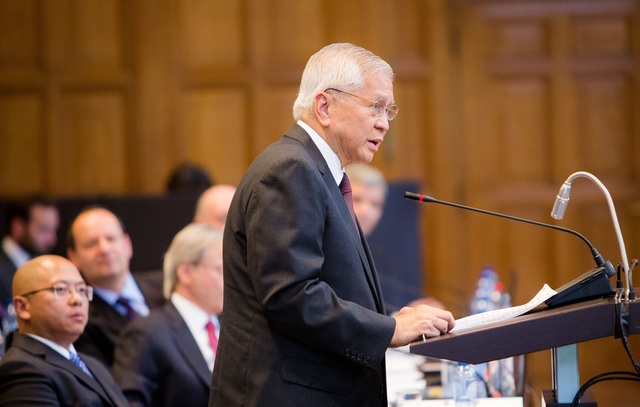When asked if the Philippines can challenge China militarily, the Philippines’ top diplomat says, ‘Maybe in a boxing match with Manny Pacquiao!’

TOP DIPLOMAT. Philippine Foreign Secretary Albert del Rosario delivers an opening statement during a hearing in July on the Philippines' case against China. File photo courtesy of the Permanent Court of Arbitration
Philippine Foreign Secretary Albert del Rosario said the US gives the Philippines “significant” military aid, but warned that nobody is stopping China from asserting its claim over the West Philippine Sea (South China Sea).
Referring to China, Del Rosario said, “It is disconcerting that nobody is stopping them.”
“That is why we are doing our best to address these challenges, specifically through political efforts in the Association of Southeast Asian Nations and bilateral consultations with China. We tried to enlist the support of countries who are sympathetic to us,” he said in an interview with the international magazine Foreign Policy.
The Philippine Department of Foreign Affairs endorsed this Foreign Policy interview by e-mailing it to reporters Wednesday, October 7.
In this interview, Del Rosario added that the Philippines' previous efforts “went well” but ended up as insufficient. “As a last resort, we had to go to international arbitration, which is where we are now.”
When asked if US response to China’s claims has been weak, Del Rosario said: “I think the US has endeavored to strengthen its allies in the region to address these common challenges. The Philippines has received significant US assistance in terms of training in equipment.”
Del Rosario’s interview with Foreign Policy, published on Monday, October 5, comes as the Philippines awaits an initial ruling on the historic case it filed against China. (READ: EXPLAINER: Philippines’ 5 arguments vs China)
At the same time, China is conducting reclamation activities that have built artificial islands that now add up to around a third of Manila City, the Philippines’ capital.
‘Rule of law vs rule of jungle’
Referring to China’s “expansionist agenda,” Del Rosario said: “They want to be a maritime power, but to be that, you need your own lake. We think they have selected the South China Sea as their lake.”
He said that now, at stake is “the rule of the law versus the rule of the jungle.”
When asked if the Philippines is in a position to challenge China militarily, Del Rosario said: “Maybe in a boxing match with Manny Pacquiao! At the end of the day, we really think international law is a great equalizer.”
While Foreign Policy published this interview with Del Rosario, Senior Associate Justice Antonio Carpio of the Philippine Supreme Court also spoke on a global platform to criticize China’s claim over the West Philippine Sea.
In a lecture at the Center for Strategic and International Studies in Washington DC, Carpio on Monday warned that if China prevails, it “will be the beginning of the end” for the United Nations Convention on the Law of the Sea. (WATCH: Rappler Talk: Making China follow the rule of law)
“The rule of the naval cannon will prevail in the oceans and seas of our planet, no longer the rule of law. There will be a naval arms race among coastal countries,” Carpio said, according to a news release by the Philippine embassy in Washington DC.
The justice added, “Will the world community allow a single country to rewrite the law of the sea?”

No comments:
Post a Comment
Note: Only a member of this blog may post a comment.